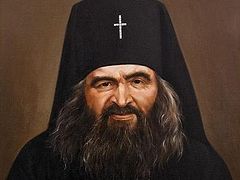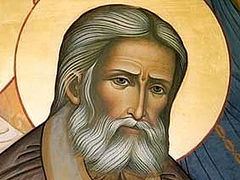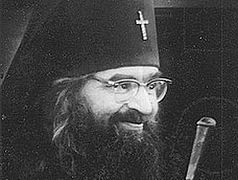It is a fearful thing to fall into the hands of the living God.
(Heb. 10:31)
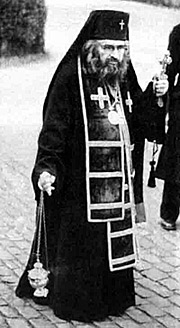
Although we can allow that there are times when a tender pat on the head is not what is needed, the modern educational theory is to coddle and be coddled. The rod has become a thing to be spared; and anyway, how can a person rebuke another for "doing wrong" when the very concept has become hopelessly outdated, stretched beyond all recognition, and highly subjective?
Sanctity is more than good deeds, or a good personality, or even good morals; it is the acquisition of the Holy Spirit, the Spirit of God. We may not always understand its workings, and its action upon us may not be "comfortable." We cannot truly venerate the saints if we do not accept this fact, because as our Lord said, Think not that I am come to send peace on earth: I came not to send peace, but a sword (10:34).
St. John (Maximovitch) of Shanghai is a saint whose extraordinary life touched people of our own time. There are still people living who knew him personally. Therefore, a very clear picture has emerged of this unearthly man that leaves no doubt—as the Holy Orthodox Church has confirmed by his canonization—that he was a wonder-worker, a clairvoyant, a saint of God. His love of God and people was so strong that he literally gave himself no rest, for he was continually engaged in prayer and service without reserving anything for himself. All his words and deeds were full of God's truth. His selfless love kept his mind always attentive to peoples' suffering, and his boldness before God wrought countless miracles of healing and salvation.
We must note, however, that although St. John was not a narrow-minded fanatic, he was stern and unyielding on matters of the faith, as we can see from his own writings and homilies and from the accounts of people who knew him. The following are a few excerpts from these writings in which we can observe this stern side of his sanctity.
ON THE RUSSIAN INTELLIGENTSIA
A significant portion of those Russians who left the country belong to the class of intelligentsia, who during the latter times were living according to Western ideas. Numbering themselves amongst the children of the Orthodox Church, confessing themselves to be Orthodox, people of that sphere significantly departed from Orthodoxy in their worldview. The main sin of people of that class was that they did not base their convictions and way of life upon the teaching of the Orthodox Faith, but strove to make the rules and teachings of the Orthodox Church agree with their own habits and desires. Therefore, on the one hand they took little interest in the essence of Orthodox teaching, often even considering the perfect dogmatic teaching of the Church inessential, while on the other hand, they fulfilled the requirements and rites of the Orthodox Church, but only insofar as these did not prevent them from having a way of life more European than Russian. This is where their negligent attitude toward fasting comes from, their visiting churches for but short periods, and even that only out of a more esthetic sensibility than a religious one, and their total lack of understanding of religion as the main foundation of man's spiritual life...
Part of the intelligentsia was destroyed, while another part left the country, saving their own lives... In the souls of the majority there occurred a marked breakdown, shown by the mass return of the intelligentsia to the Church. Many churches outside of Russia are filled with these. The intelligentsia began to be interested in questions of spiritual life, and started actively participating in Church affairs. Many circles and societies have formed with religious-enlightenment aims; their members study the Holy Scriptures, the Holy Fathers, and in general spiritual life and matters of theology. Many of them have become priests.
Nevertheless, all of these positive manifestations also have a negative side. By far not all who converted to the faith accepted it in all the fullness of Orthodox teaching. The proud mind could not concede that it still stood upon a false path. The converts began to try to make Christian teaching agree with their former views and ideas. From this came a number of new religious-philosophical tendencies often utterly foreign to the teaching of the Church...
Not only are the physical murderers guilty of the sin of regicide [of Tsar Nicholas and the royal family], but the entire mass of people who rejoiced at the Tsar's dethronement, and allowed his humiliation, arrest, and exile, leaving him helpless in the hands of criminals, which led to his inevitable death."[1]
ON CLEANSING OF SINS THROUGH SUFFERING
Thus, the catastrophes that came upon Russia are direct consequences of serious sins, and its resurrection is possible only after being cleansed of them...
One must salute and respect those who bear their cross of a refugee, doing difficult work to which they are not accustomed, living in conditions that they never knew or even thought about, but remaining nevertheless strong in spirit, preserving nobility of soul and ardent love for their fatherland, and repenting without murmuring for their former sins, bearing the trial. Truly, many of them, both men and women, are more glorious in their dishonor than during their glory, the riches of soul they have gained are now better than the material riches they left in their homeland, and their souls like gold purified by fire, have been purified in the fire of suffering, and burn like bright lamps.
But with great sorrow we have to note that by far not all have received such benefit from suffering. Many have shown themselves to be not gold or precious metal but cane and straw perishing in the fire. Many have not been purified or made white by suffering, but rather without enduring the trial, they became worse than they were before. They have become hard, and do not understand that when we are punished by God, we must feel consoled, understanding that there are no children that have never been punished, that by punishing us, God looks upon us as sons and daughters, who must be corrected by punishment. Forgetting about their former sins, such people add sin to sin instead of repenting, insisting that there is no use in being righteous, that God either does not see human deeds and turns His face away from them, or even that "there is no God." In their false righteousness, they think that they are suffering innocently; such proud hearts are worse than the Pharisee who exulted himself, but in their lawlessness they often exceed the publican. In their hardness against God, they are no better than the persecutors of the faith in our homeland, and their thinking has become absolutely akin to theirs...[2]
ON THE DECLINE OF FAMILY VALUES
The sanctity of marriage has literally ceased to exist and marriage has turned into an ordinary contract. Many respectable couples who have lived together for decades in happy and seemingly indestructible marriages have dissolved their marital bonds and tied new ones. Some have done this after being vanquished by passion, others to get ahead by their new marriages. They seek out all possible reasons and bases for dissolving their marriages, which often even turn out to be false under oath.
The new marriages, amongst the middle-aged and young people alike, are no more stable. It has become a usual thing to see requests for dissolution of marriage several months after their inception. The slightest misunderstanding or disagreement now becomes the cause of the end of the marital union, because the awareness of the sinfulness of violating marriage has been completely lost. The Church authorities have broadly condescended to the weaknesses of the present generation, greatly easing the conditions for dissolution of marriage. Nevertheless, the licentiousness seemingly knows no bounds, going around even those rules that now exist. After the dissolution of marriage, they quickly enter into new ones that are just as unstable, and then often enter into third ones.
Not being able to indulge their lusts by marrying and paying no attention to any Church and moral laws, many go even further, considering it unnecessary to turn to the Church for a blessing of their union. In countries where civil laws allow for registration of marriage and do not require Church weddings, cohabitation without a Church wedding is becoming more and more frequent, as well as the cessation of family relations through civil divorce, although the marriage was blessed in Church. They forget that the sinfulness of this activity does not lessen for the new, respectable name, and that any cohabitation that has not been blessed by the Church is fornication and adultery. Many live openly unlawfully, without even any attempt to hide their obvious wantonness. Some do this out of passion, others to get ahead through their cohabitation; suppressing all shame, they are not ashamed to show up everywhere in society with their cohabitants, whom they even dare to call their spouses...[3]
ON SIN—TWO FEASTS
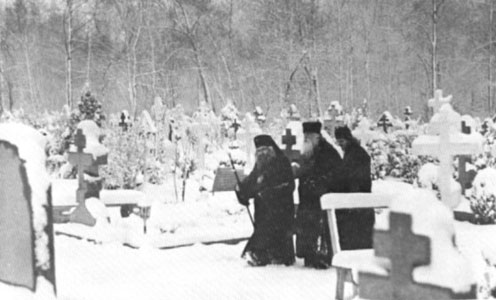 Vladyka John in the cemetery at New Diveyevo Convent.
Vladyka John in the cemetery at New Diveyevo Convent.
The other feast, not a parable but a real one, was given by King Herod. No one refused the invitation to this feast. To the contrary, all those called came in festal garments and indulged themselves fully. The feast went on in drunkenness, lasciviousness, and ended in a terrible crime—the murder of John the Baptist.
These two feasts, described in the Gospels, are images of two different ways of life and two kinds of delight. The first is the image of a spiritual feast and spiritual joy. The Lord gives it. This is the feast of life in the Christian Church. All are invited to this feast, to participation in the services, especially to Divine Liturgy and Communion of the Holy Body and Blood of Christ, to doing good, to a concentrated spiritual way of life. But many of us refuse to participate in this feast, in that we miss the Church services, do evil instead of good, and prefer daily cares to communion with God. If we bring an alien, sinful state into our lives, then we dress ourselves in clothes inappropriate for a wedding feast. Every time a person prefers the sinful and fleshly over the spiritual and divine, he refuses the spiritual feast.
We are also invited to Herod's feast, even many times a day. Our calamity is that we often do not notice that we are being drawn in by a sinful desire, and therefore sin sneaks up on us unnoticed. Herod himself once listened with pleasure to St. John the Baptist. Probably he recognized the sinfulness of his desire, but he did not struggle with it, and finally he arrived at the sin of murdering a great, righteous man. Each of us goes to the wicked feast of Herod every time we agree to evil, when we choose fleshly and sinful delights, when we are unmerciful, or inattentive to our own souls.
We begin with a trifle, and it becomes hard to stop. If we do not come to our senses in time and take ourselves in hand, we can arrive at terrible sins and crimes, which will bring us eternal torment.
Then as now, St. John the Baptist calls to us: Repent ye: for the kingdom of heaven is at hand (Mt. 3:2). Repent, that you may delight in the feast of the Lamb, slain for the sins of the whole world, in bright and eternal habitations, and not share in the devil's feast of torments in tartarus and outer darkness.[4]
ON ANATHEMA
In the acts of the Councils and the further course of the New Testament Church of Christ, the word “anathema” came to mean complete separation from the Church. “The Catholic and Apostolic Church anathematizes,” “let him be anathema,” “let it be anathema,” means a complete tearing away from the church.
While in cases of “separation from the communion of the Church” and other epitimia or penances laid on a person, the person remained a member of the Church, even though his participation in her grace-filled life was limited, those given over to anathema were thus completely torn away from her until their repentance. Realizing that she is unable to do anything for their salvation, in view of their stubbornness and hardness of heart, the earthly church lifts them up to the judgment of God.
That judgment is merciful unto repentant sinners, but fearsome for the stubborn enemies of God.
It is a fearful thing to fall into the hands of the living God … for our God is a consuming fire (Heb 10:31; 12:29).
Anathema is not final damnation: until death, repentance is possible.
“Anathema” is fearsome not because the Church wishes anyone evil or God seeks their damnation. They desire that all be saved. But it is fearsome to stand before the presence of God in the state of hardened evil: nothing is hidden from Him.[5]
HIS INTOLERANCE OF SPIRITUAL INDIFFERENCE
Archbishop John was ruthless and intolerant towards Clergy who were lax and indifferent in matters of spiritual integrity. For this he was hated to such an extent that there was even an attempt to poison him during Pascha, and he barely survived... His integrity in matters of the Church, and especially in matters of liturgical precision, indicate that his concern for his flock was not a matter of personal preference, but came out of the whole liturgical realm of Church services and the ecclesiastical philosophy of life, dogmatic and pastoral, which were a part of the apostolic succession preserved in Orthodoxy. He consciously lived in and operated from this otherworldly realm, formed historically by the Church Fathers, and thus he had a virtual disdain for the pragmatic expectations placed on one by the times and fashions. He was an enemy of fashion and gossip and pharisaical narrow-mindedness...
Once when I was serving in church, I entered the altar and Archbishop John pointed to my tie. I did not know what this meant. A boy then took me aside and told me to take off the tie because Archbishop John did not allow servers in the altar to have ties. I noticed that all the subdeacons also had no ties. Later I found out that the real reason why he would not allow ties in the altar was because a tie is a hanging-noose and represents death, while the altar represents heaven and life...
Archbishop John never spoke in the altar. When something would go wrong he would only click his tongue as a sign that a correction was due. He would continue doing this until it was done right...[6]
ON WEARING MAKE-UP
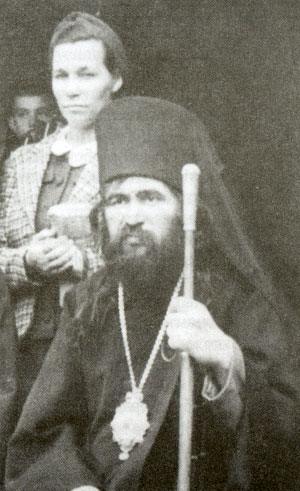 In Shanghai, with Mrs. Shakhmatova.
In Shanghai, with Mrs. Shakhmatova.
WE MUST BE LIKE THE SAINTS
Vladyka John would point out that you cannot teach something if you do not have it yourself. He fulfilled the commandments that he taught. Always he read and reread the Lives of Saints. They are living examples, he would say, of people who were like us. Perhaps some were even greater sinners than us and had even more weaknesses than we do, but they still made it. Therefore he had the right to demand of us what he did.
He was attacked and persecuted because he was a saint, but he returned good for evil. We saw him do it.
It is hard for me to imagine that this great saint is the same man who used to stroke my head.[7]

